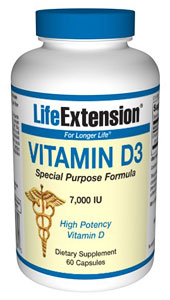New York: Higher doses of Vitamin D are needed to protect older adults against bone fractures, according to an analysis of several recent clinical trials.

The New England Journal of Medicine which examined 11 such trails reveals a protective effect for high dose vitamin D supplementation against the risk of fracture in older men and women. While 800 international units (IU) or more of the vitamin was associated with reduced fracture risk, lower doses did not appear to be effective.
“Vitamin D supplementation is an efficient intervention for a costly injury that affects thousands of older adults each year,” remarked senior author and Tufts University School of Medicine professor Bess Dawson-Hughes, MD.
“The average recovery is long and painful and deeply impacts quality of life. After a fracture, older patients may only regain partial mobility, resulting in a loss of independence that is personally demoralizing and that can place added stress on family members and caregivers.”
Dr Dawson-Hughes and her colleagues analyzed data from 31,022 individuals age 65 and older who were assigned to receive up to 2,000 IU oral vitamin D or a placebo in one of 11 randomized, controlled trials. Those who received the vitamin had a modest 10 percent lower risk of hip fracture and a 7 percent reduction in nonvertebral fracture overall; however, a stronger effect emerged for higher dose vitamin D when the participants were analyzed according to dosage. Among those whose vitamin D was among the top 25 percent of subjects at a median of 800 IU per day, there was a 30 percent lower adjusted risk of hip fracture and a 14 percent lower risk of nonvertebral fractures in comparison with those whose vitamin D intake was lowest.
“Taking between 800 IUs and 2,000 IUs of vitamin D per day significantly reduced the risk of most fractures, including hip, wrist and forearm in both men and women age 65 and older,” stated Dr Dawson-Hughes, who is the director of the Bone Metabolism Laboratory at the Jean Mayer USDA Human Nutrition Research Center on Aging at Tufts University. “Importantly, we saw there was no benefit to taking vitamin D supplements in doses below 800 IUs per day for fracture prevention.”
“Evaluation of individual-level data is the gold-standard of meta-analysis,” noted lead author Heike Bischoff-Ferrari, MD, DPh, who is the director of the Centre on Aging and Mobility at the University of Zurich and Waid City Hospital, and a visiting scientist at the Bone Metabolism Laboratory.
“Our results make a compelling contribution to the existing data on vitamin D and fracture risk in men and women age 65 and older, whose vulnerability to bone density loss and osteoporosis leave them prone to fractures resulting from thinning bones.”
High dose vitamin D is available at The Vitality Shop UK

